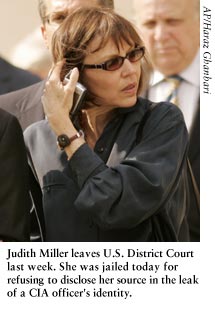Washington, July 6, 2005—The Committee to Protect Journalists is deeply disturbed that a U.S. judge has sentenced a journalist to prison for refusing to reveal her confidential source to a grand jury investigating the leak of a CIA operative’s identity.
Judge Thomas F. Hogan, in a hearing in U.S. District Court, ordered Judith Miller of The New York Times jailed immediately for contempt of court. He ordered her held in a Washington-area jail until October, or until she agrees to testify. Miller said she will not.
A second reporter who faced prison, Matthew Cooper of Time magazine, told Hogan that he would cooperate with the investigation because his source gave him “personal consent” today to discuss their conversation. “I am prepared to testify,” Cooper told Hogan.
Hogan had found both reporters in contempt and imposed prison terms last fall, but stayed the sentences pending appeals by the journalists. The avenue for appeals ended last week when the U.S. Supreme Court declined to hear the case. Time, which had also been found in contempt last fall, agreed last week to hand over internal records, notes, and e-mails that were sought by Fitzgerald.
Syndicated writer Robert Novak first identified the CIA officer, Valerie Plame, in a July 2003 column, attributing the information to two unnamed “senior administration officials.” Cooper wrote about the disclosure later; Miller conducted interviews but never wrote a story.
A special prosecutor, Patrick Fitzgerald, was appointed by then-Attorney General John Ashcroft to determine whether any government officials committed a crime by willfully disclosing the identity of the undercover agent. Government prosecutors and the columnist have refused to say what information, if any, Novak provided to the grand jury. Novak was not publicly compelled to testify and he was not cited for contempt.
No government official has been charged in Fitzgerald’s investigation. The prosecutor has said in court papers that his investigation is nearly complete. In motions filed this week, Fitzgerald claimed that the source for Cooper and Miller had waived confidentiality. He did not identify the source or sources.
“Governments worldwide have taken note of the decisions made by the U.S. prosecutor and courts in this case. We are deeply concerned that an investigation intended to uncover potential wrongdoing by U.S. government officials has instead sent a terrible message to the rest of the world,” said Ann Cooper, executive director of the Committee to Protect Journalists. “Repressive regimes who routinely jail journalists have already used this case to justify their actions.”
CPJ research has found at least two instances in which other governments have cited the U.S. case to justify the imprisonment of journalists or the passage of restrictive press laws.
In January, the Cameroonian government defended the imprisonment of a journalist on defamation charges by saying in a letter to CPJ: “You are aware that courts have decided in a number of countries that protection of free speech does not grant journalists, for instance, the privilege to refuse to divulge sources in all circumstances.” In December 2004, Venezuelan officials cited the U.S. case while responding to international criticism of its new media law restricting broadcast news coverage in the name of preserving social order. (For more details, read the commentary by Frank Smyth ).
Novak’s column came eight days after Plame’s husband, former diplomat Joseph C. Wilson IV, wrote an op-ed piece in The New York Times challenging the Bush administration over its allegations regarding Iraq’s weapons programs. Numerous reports later asserted that administration officials had leaked Plame’s identity in retaliation against Wilson.
Around the world, 122 journalists were imprisoned at the end of 2004, according to CPJ research, and for the first time in three years, the United States joined the list of nations imprisoning journalists. Television reporter Jim Taricani was sentenced to home confinement in December 2004 for not revealing the source of a leaked government surveillance tape.
![]()
